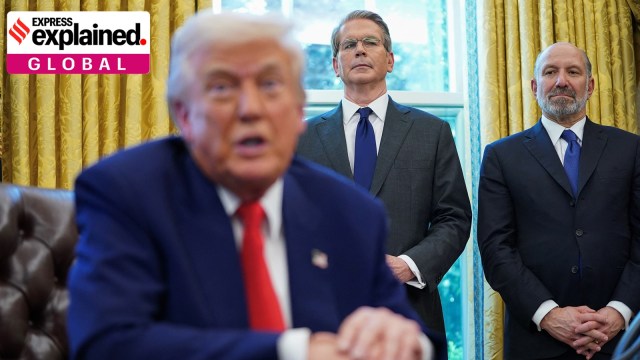Explained: 3 key Trump administration figures advising the US President on tariffs
Apart from the rapidly shifting policy on tariffs in recent days, “conflicting narratives” from the Trump administration have also added to the uncertainty.
 U.S. Commerce Secretary Howard Lutnick (right) and Secretary of the Treasury Scott Bessent stand with President Donald Trump in the Oval Office. (REUTERS/Nathan Howard)
U.S. Commerce Secretary Howard Lutnick (right) and Secretary of the Treasury Scott Bessent stand with President Donald Trump in the Oval Office. (REUTERS/Nathan Howard)The US government’s whirlwind policy changes over its retaliatory tariffs have shaken up global markets this week. On Monday (April 7), Reuters reported that a “historic” rout had wiped off $10 trillion from major stock markets.
Within two days, US President Donald Trump announced that tariffs on Chinese goods were being raised to 125%, while those on other nations were paused for 90 days (except the flat 10% tariffs for all countries). The US stocks immediately surged, including the Dow, the S&P and Nasdaq.
A sense of uncertainty also flows from the public statements by key Trump administration figures. According to The Wall Street Journal, the chairman of the White House Council of Economic Advisers, Stephen Miran, recently acknowledged “conflicting narratives” from the administration on whether they were open to deals with countries to reduce tariffs.
The president’s trade and manufacturing adviser Peter Navarro recently wrote in The Financial Times that the measure was “not a negotiation”, while Treasury Secretary Scott Bessent said in a social media post that the administration would “open negotiations” with Japan.
Who are the officials advising the president on tariffs and the latest turnaround? We take a look.
- 01
Peter Navarro, counsellor for trade and manufacturing to the president
WHO IS HE? Navarro, 75, previously served in the first Trump administration (2017-21). He is a professor of Economics and Public Policy, having earned a PhD from Harvard University. In 2024, Navarro was released from prison after serving a four-month sentence. He had defied a congressional subpoena from a committee investigating the January 2021 US Capitol riots, in which Trump supporters were involved. While announcing his appointment in 2025, Trump said he was “treated horribly by the Deep State, or whatever else.”
 Peter Navarro, President Donald Trump's trade adviser, in the Oval Office at the White House in Washington, Feb. 10, 2025. (Eric Lee/The New York Times)
Peter Navarro, President Donald Trump's trade adviser, in the Oval Office at the White House in Washington, Feb. 10, 2025. (Eric Lee/The New York Times)VIEWS ON TARIFFS: He has long advocated for tariffs, framing them as necessary for holding “foreign countries accountable” for the “substantially higher tariffs and crushing non-tariff barriers imposed on us by other nations.” Navarro has also written several books, including some focused on China’s economy, which first brought him on Trump’s radar.
Navarro cited a Harvard-educated expert across multiple books, later revealed to be a fake identity he created using letters of his own last name – “Ron Vara”. The New York Times noted that in his book The Coming China Wars, a section about China’s “poisoned food chain” warned about “toxic Chinese fish being exported to the United States”, with a quote from Ron Vara saying, “You’ve got to be nuts to eat Chinese food.” In 2019, Navarro defended himself by terming it a “whimsical device.”
- 02
Scott Bessent, Treasury Secretary
WHO IS HE? Bessent, 63, has been in the global investment management business for 40 years, according to his official profile. A former adjunct professor at Yale University, he has previously served as the Chief Investment Officer of Soros Fund Management, an investment management firm owned by billionaire investor George Soros. Notably, Soros has long donated funds to the Democratic Party.
VIEWS ON TARIFFS: Unlike Navarro, Bessent has said tariff negotiations were on the table and that having countries come to this point was the strategy all along. “I think...at the end of the day that we can probably reach a deal with our allies, with the other countries that have been...good military allies and not perfect economic allies. And then we can approach China as a group,” he said. Bessent also warned that despite a “tariff wall” in the US, China could continue dumping goods in other countries.
According to American journalist Charles Gasparino, Bessent’s more conciliatory stance got Trump’s approval and led to the decision on lower tariffs. The FT reported, “The shift in clout on Trump’s trade team reflects the president’s dawning realisation that he has to show he is trying to stabilise markets after withering criticism from all sides of the political spectrum and from many business leaders that he has been too complacent about the damage his tariffs would inflict on the economy and the financial sector.”
- 03
Howard Lutnick, Commerce Secretary
WHO IS HE? Lutnick, 63, was the chief executive of the financial services firm Cantor Fitzgerald. He has become a central economic adviser to Trump over the past year and led his transition team after the November elections, according to The NYT.
VIEWS ON TARIFFS: Lutnick handed Trump the board containing the list of countries and rates of respective tariffs on the day of his announcement. He recently told CNN, “I don’t think there’s any chance… that President Trump’s going to back off his tariffs.” He added that the world “should stop exploiting the United States of America.”
Lutnick has previously defended tariffs as protectionist measures required for US industries. Speaking to CBS on Sunday, he said of the tariffs, “They are definitely going to stay in place for days and weeks. That is sort of obvious. The president needs to reset global trade. Everybody has a trade surplus and we have a trade deficit... This is the policy we're going to protect”.
However, there is no guarantee that the current preference for Bessent may hold over the next few days.
This may also happen as more hawkish voices are deployed in reacting to China, as the tariff war increasingly focuses on that country.
- 01
- 02
- 03
- 04
- 05


 Peter Navarro, President Donald Trump's trade adviser, in the Oval Office at the White House in Washington, Feb. 10, 2025. (Eric Lee/The New York Times)
Peter Navarro, President Donald Trump's trade adviser, in the Oval Office at the White House in Washington, Feb. 10, 2025. (Eric Lee/The New York Times)


































